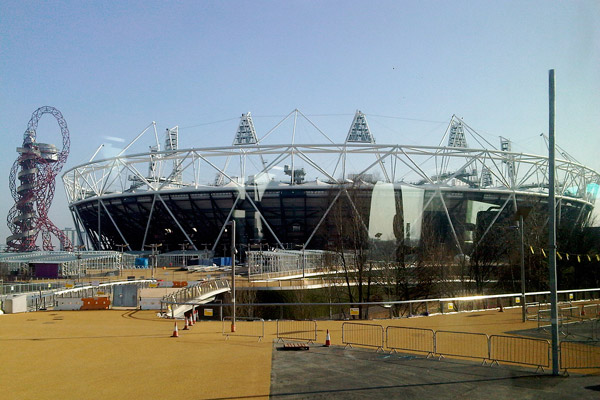
One of the reasons that Chicago didn't get the 2016 Olympics was a throw-down between the IOC and the USOC over revenue sharing. It's not the only reason—Rio likely had an edge as a South American country, a region that had never hosted an Olympic Games—but it was a factor. Now that fight is over, as Philip Hersh reports in a lengthy article, clearing the way for a potential 2024 Summer Olympics in the States. Which could very well mean a reconsideration of and by Chicago, given its otherwise respectable performance in the dog-and-pony-show.
The A.V. Club's Marcus Gilmer deals with a lot of the reasons to be skeptical of such an idea, which are well worth revisiting—not just because of the remote possibility of hosting the Olympics in 12 years, but because of the broader question of whether it's a good idea for cities to pursue such international mega-events. More reasons to be skeptical are on parade in London, which is a couple months away from the Summer Games.
* The "branding zone." It's sort of like a free-speech zone but in reverse, where areas of the city are limited to the advertising of official Olympic brands. There are different levels of branding protection, reaching their height in and around the events:
No journalist covering the Games is allowed any ‘signage of any kind’, even for his or her own publication — on ‘camera bags, hats or other garments’.
But the control extends well out out into the city:
The city authorities must also "obtain control of all billboard advertising, city transport advertising, airport advertising etc for the duration of the games and the month preceding."
Guerilla marketing: not just a clever name, at least this summer in London.
* Drones. Remember the brief panic last week about a drone surveilling the NATO conference? They've got those. And surface-to-air missiles. And LRADs. And a security force of 24,000-49,000.
* 63 of the city's courtrooms—just less than half—are closing for seventeen days. Hopefully they won't have any mass arrests.
* Um: "Beware Drones Carrying Poison, London Residents Told." Those, however, would not be sanctioned poison-carrying drones.
By contrast, Chicago was practically an anarco-pacifist commune during the NATO summit.
But it'll all be worth it, right? Moody's isn't so sure:
Moody's described the Games as a "huge marketing opportunity for corporates" but echoed the view of many economists that the Olympic effect was likely to prove fleeting.
[snip]
"We expect the net impact of the Olympics on UK tourism will be positive overall, but far less than gross visitor numbers would suggest," he added. The Olympics often attract sports fans
at the expenses of higher spending business travellers and general tourists who decide to stay away for the duration.
I can't help but wonder if the 2012 Summer Olympics will be the tipping point for Olympic fever: a country in the midst of recession and austerity hosting a tremendously expensive event under extensive military and police coverage while ceding commercial control of much of the city to a private enterprise.
Is it crazy for cities to pursue events like the Olympics? There's (some) logic behind it. As I've written before, there's evidence that, at least at the national level, countries benefit from trying to get the Olympics. The problem, unfortunately, is actually winning.
Photo: myeralan (CC by 2.0)


